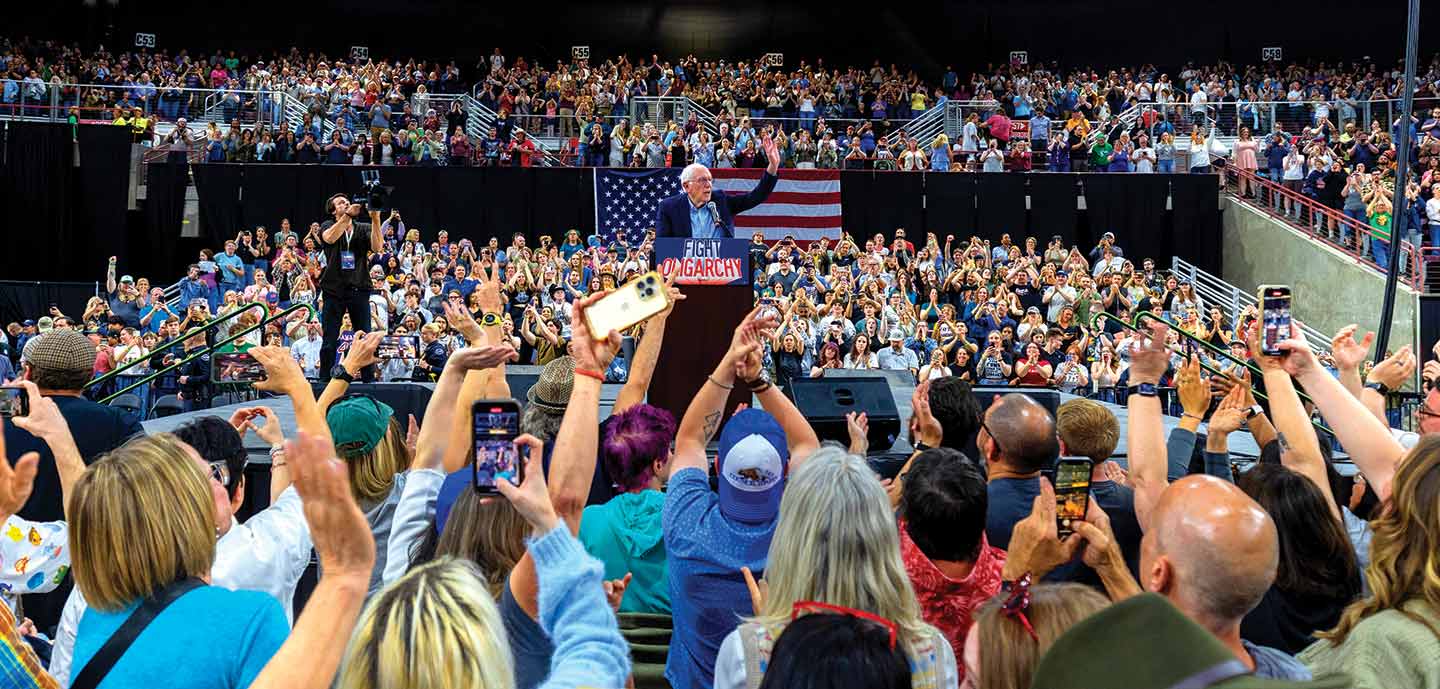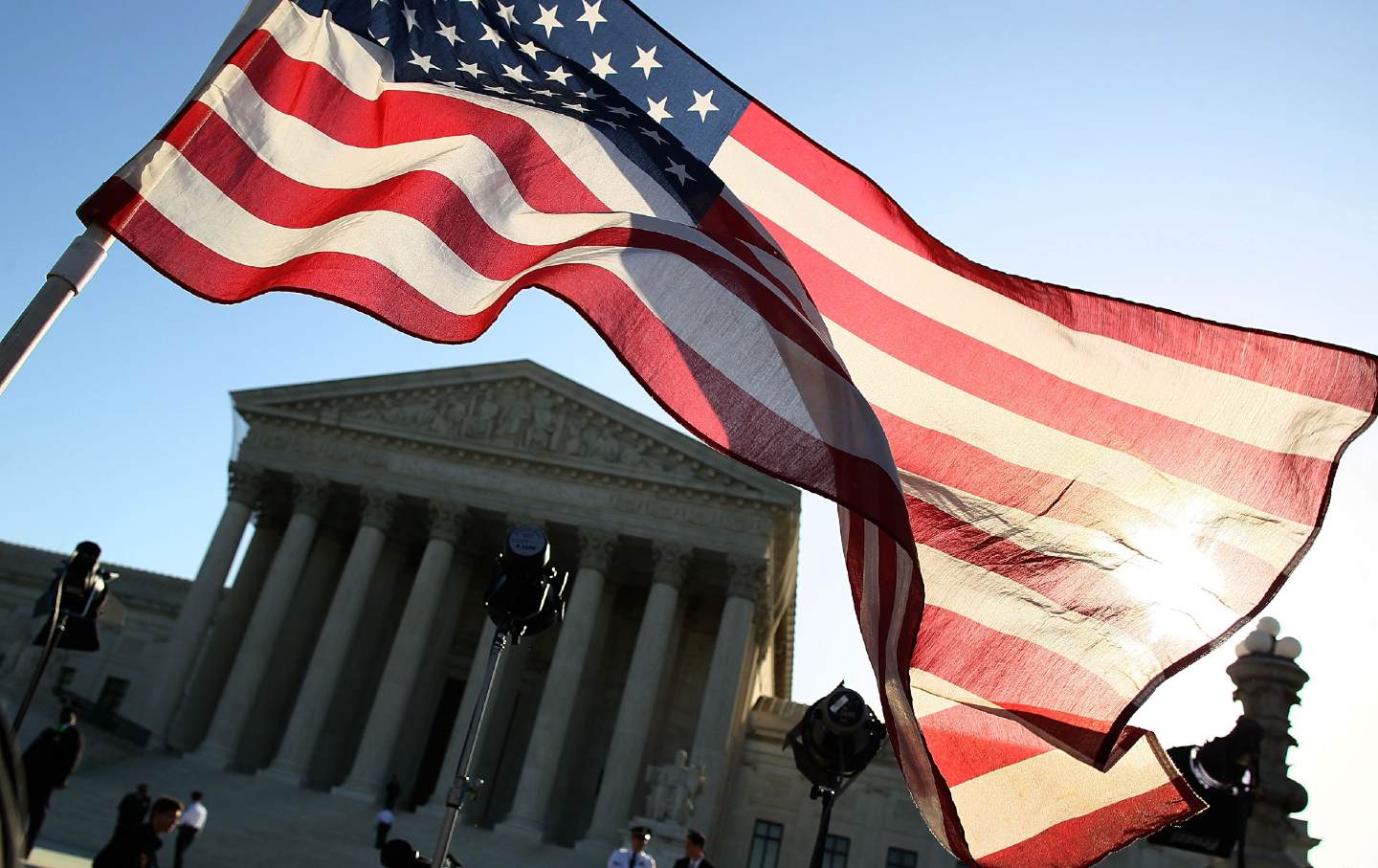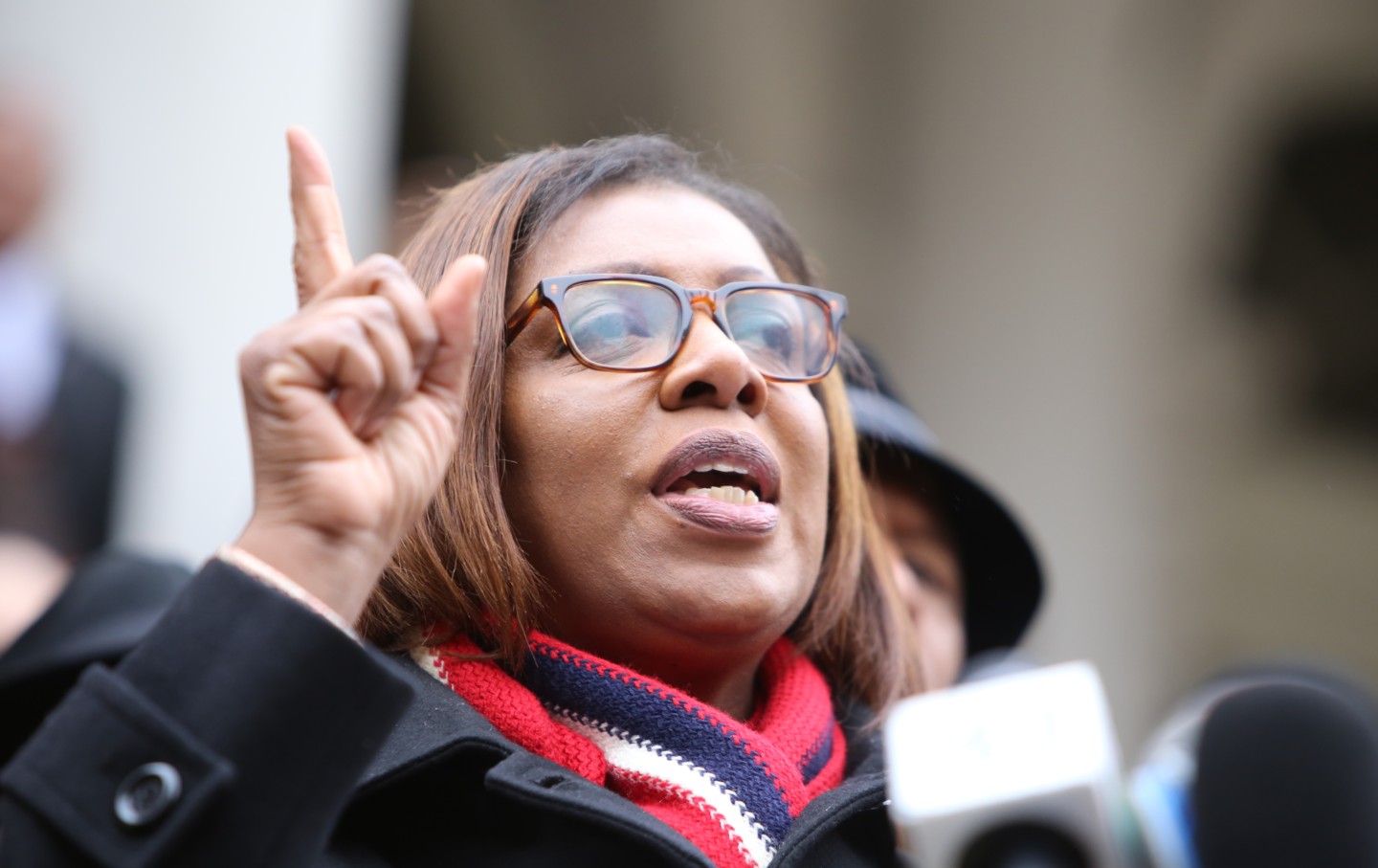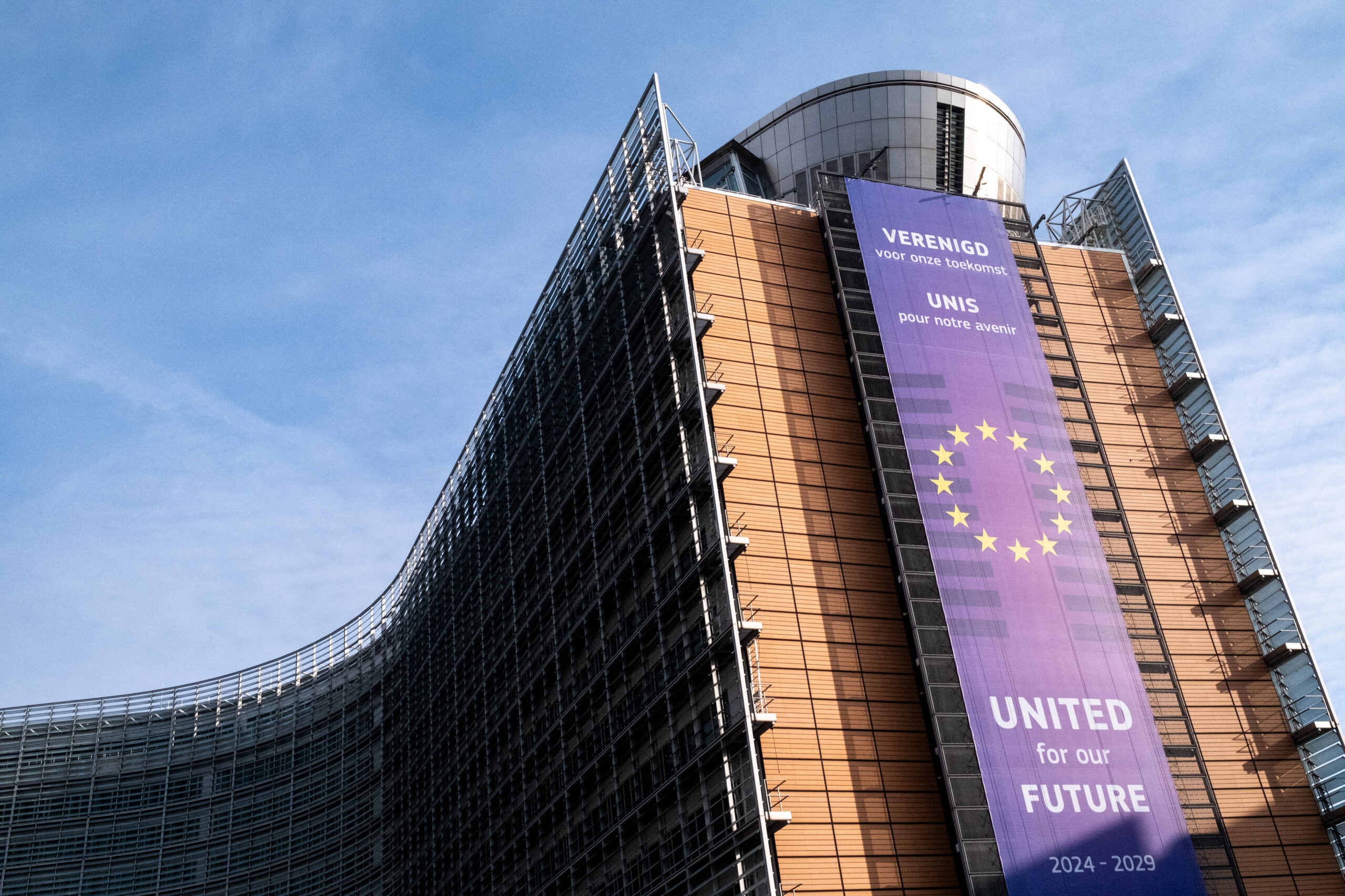Poll after poll in recent months has revealed that, while approval ratings for Donald Trump are tanking and are also down for congressional Republicans, attitudes toward the Democratic Party are even more negative. And, as The Christian Science Monitor has pointed out, “One subgroup driving the Democrats’ poor ratings [is] their own base. A recent CNN poll found that Democratic voters currently hold far more negative views of their own party than Republican voters do of theirs. At town hall events and in focus groups, frustrated Democrats say they want their representatives to push back harder against the Trump administration.” Surveys show a mounting anger on the part of grassroots Democrats with party leaders, who are seen as having failed to mount a coherent opposition to congressional Republicans or to articulate bold positions on the issues of the day.
Senator Bernie Sanders shares their frustration. The Vermont independent and two-time contender for the Democratic presidential nomination has spent recent months traveling the United States with a “Fighting Oligarchy” message that has drawn massive crowds at dozens of events, including in some of the bluest and reddest parts of the country. He has come away from the experience with a powerful sense that the party needs a new direction. To that end, Sanders has been endorsing insurgent Democratic primary candidates, and in states where the party organization has atrophied, he has said he’s open to endorsing independents. Among them is 34-year-old democratic socialist Zohran Mamdani, the Democratic nominee for mayor of New York. But even as the senator was enthusiastically campaigning for Mamdani, Democratic Party leaders from New York were refusing to do so.
Sanders spoke with The Nation about how his longtime concerns about the leadership of the Democratic Party have been amplified in recent months—and about what he believes it must do to reconnect with working-class voters, expand its base, and appeal to disenchanted independent and irregular voters.
The Nation: You have never been a Democrat and have always served as an independent. But you’ve caucused with the House and Senate Democrats and worked with many Democratic presidents over the years. And, of course, you came close to being their nominee for president of the United States.
Sanders: [Laughs] Never been a Democrat—almost their nominee for president.
The Nation: That gives you a unique perspective on the party. In fact, you’ve probably thought as much about the direction of the Democratic Party as anyone in American politics. So, at a point when a lot of people are wrestling with the question of what the party stands for and where it is headed, give me a sense of your current thinking about what ails the party.
Sanders: I think the obvious answer, which has been stated 5 million times, is that they’re way out of touch with where ordinary people are. By and large—with exceptions, and each state is a little bit different—the Democratic Party [at its top] is mostly made up of folks who have money and consultants, and politicians who work with folks who have money and consultants. And so, if you look at how many of the “leading Democrats” function, are they out holding electoral rallies, talking to ordinary people? They can’t, because people aren’t going to come out—there’s not much to see. They spend an enormous amount of time raising money…. They’re not about to take on the people who provide them with the money.
I was really surprised—and I didn’t really appreciate this until I ran for president—at how weak [the party is in much of the country]. I mean, they really had to go crazy to beat me. And we started at 1 percent [in the polls], with no money, no support, nothing.
I discovered that, to a large degree, the party is a paper tiger. There wasn’t anything there. We arranged our schedule, in 2016, to go to Democratic Party events, and we would schedule a rally on the same day. We’d be in the same community—kill two birds with one stone. So in the afternoon I’d go to a rally—it’d be 10,000 people out there. They’d be young, they’d be excited, they’d be really involved. Then in the evening I’d go to the official Democratic Party function. There’d be 200 people, mostly older—businesspeople, lawyers, politicians. It was day and night. It was two different worlds.
Obviously, the future is with young people, people of color, union people, etc., etc. But the party leadership doesn’t seem to recognize that. I was in West Virginia recently. I met with some of the best people. But they have one [full-time] staffer in the Democratic Party in West Virginia. So it’s almost nothing. And that’s probably true for, I don’t know, five, 10 states in the country, where Democrats have almost no representation in the legislature, don’t hold the governor’s office, have no representation in Washington. Democratic bodies completely folded in those areas. I think they’re also in a lot of trouble in [traditionally Democratic] states like New York, for example, where they have not much to say to ordinary people.
If you want to know where the Democratic Party is at, I would say Zohran Mamdani’s campaign [for mayor of New York] is a crystallization of that. You would think, if you had a candidate who generated, as I hear, some 50,000 volunteers, enormous enthusiasm, and then wins the Democratic primary despite being heavily outspent, that the Democratic leadership would be excited, enthusiastic. Here is a candidate who is tapping the energy of young people, of working people. Oh, my God—in a day of Trumpism, what a great moment!
But the party leadership is saying, “Oh, we can’t support him. We can’t support him, because he is saying what 75 percent of Democrats say about Israel: ‘No more money for Netanyahu.’ Oh, can’t support him.” I mean, this is beyond absurd. This is beyond laughable. It is pathetic. So you have the leading Democrats in New York State, as I understand it, who have not yet indicated their support for the guy who won an overwhelming victory for the Democratic nomination. That’s the crystallization of your Democratic Party. So who are they representing? Are they representing the 75 percent of people who don’t want to give Netanyahu any more money? I guess not. Are they representing a significant majority of the people who voted for Mamdani [in the primary]? I guess not.

The Nation: Why is there such a disconnect between the leadership and their own voters?
Sanders: They don’t want to open the door, and, in fact, they’re pretty firm about keeping that door shut.
So the door gets busted open: Don’t ask—tell them we’re in. And I think the Mamdani campaign is a crystallization of that. And if the Democratic leadership can’t support the Democratic nominee, what is the Democratic Party? Who’s the Democratic Party?
The Nation: There’s an interesting dynamic there, because it’s a very uneven, very unfair game when it comes to endorsements, right? If a moderate wins a primary, then the message from party leaders to the progressive community is: “You have got to get on board today. You’ve got to show support, prove to us you’re loyal to the party.”
Sanders: Yes, that is right. Again, you’re absolutely right. But that [pressure tactic] is no longer going to work. No one believes that anymore. That’s over with…. The Democratic Party no longer even can dream of saying to you, you know, “Mary Smith won. You may not like her politics, but she’s the Democratic nominee. You, as a progressive, have got to support her.” That’s over with. No one takes that seriously. If they can’t support Mamdani, then, of course, they can’t make that request of anybody.
Bottom line: A guy wins his primary with great enthusiasm, grassroots activism, and their response is: “We can’t support you.” Then who the hell can you support? What do you think the future of the Democratic Party is? Do you think AIPAC is the future of the Democratic Party? I don’t think so.
The Nation: Let’s dig deeper into several of the things you’ve said. You were talking about what you’ve seen around the country: Democratic parties in some states have virtually atrophied—they’re almost nonexistent. My sense is that this is even truer at the county level, the local level. But, in a sense, this is an opening for progressives, isn’t it? Because there are places where people could get on the Democratic Party ballot line and be the Democratic Party.
Sanders: Someone was telling me recently, I think from West Virginia, that in some local elections, Democrats had no candidates—zero candidates. So when you have nothing, when you don’t have a party, can anybody who’s interested become the candidate? Probably, yes. But it does speak to something else: When you think of a party—maybe I’m old-fashioned and conservative—you think of thousands of people coming together at the grassroots level to nominate and support a candidate, energy coming from the bottom on up. That is not in any way, shape, or form what the Democratic Party is about.
If you want to know who the Democratic leadership listens to, think about this: I remember when Biden dropped out, or just before he dropped out, The New York Times was running front-page stories about all these people who are—now, literally, they say it—the donor class. “The donor class has decided that A, B, and C are the right candidates. The donor class says this; the donor class says that.” I mean, they don’t even hide it anymore. All right, so the money people decide who the candidates are, put in money, and [get a candidate]. Meanwhile, as I said, in five or 10 states, the party barely exists. How do you call yourself a national party if you barely exist in five or 10 states—states in the South, states in the West?
The Nation: So as we move toward 2026, you are encouraging candidates to run and campaigning for them. These are candidates who, more often than not, aren’t on the same page as the leadership. Some are actually running as independents. Do you think we’re at a critical juncture for the Democratic Party? What kind of moment should we see this as?
Sanders: You have got to understand that this is not just an American issue. Centrist parties like the Democratic Party are falling by the wayside all over the world. I was in the UK recently. You know what the leading party is right now in the UK? It’s the Reform Party—the right-wing extremist line.
The Nation: Nigel Farage, who is friends with Trump.
Sanders: Exactly. They’re winning. They’re way ahead. The Labour Party is like the Democratic Party: It stands for nothing. And, you know, [former Labour Party leader] Jeremy Corbyn is now starting a new party. You’ve got similar things happening all over the world.
The Nation: The traditional centrist parties, the traditional center-left parties, which have governed countries, are beaten down. People are rejecting them.
Sanders: So you’ve got the Democratic Party, the Labour Party in England; in Germany, the Social Democrats are in deep struggle. All these centrist-type parties that once had some attachment to the working classes of their country are in trouble. So there’s a question, you know, whether even the Democratic Party [will continue to exist as we know it]. It may fall by the wayside completely like the Whig Party. It’s possible. But the name doesn’t mean anything.
If your question is, “Is it conceivable that good people can take over the Democratic Party and make it a working-class party, a multigenerational party, welcoming diverse points of view?”—that’s a possibility. But I think people are now struggling with whether it is worth it. To take on Trump, do they want to take on AIPAC and the Democratic Party, or would you start a third party? That’s what they’re talking about in England right now. Corbyn is starting that. And I guess he has finally decided the Labour Party is useless. And I think a lot of people are thinking that about the Democratic Party right now. So the choice is whether you take over the Democratic Party, make it into a working-class party, or whether you start your own party.
The Nation: It’s very hard to start a viable third party in the United States.
Sanders: Very hard in this country, in this context. It’s easier in England, I think. [In the US,] you need an enormous amount of money and have to deal with 50 states’ rules and regulations, which are against third parties. So that’s the challenge.
But I think it goes without saying that the Democratic leadership is way out of touch with where the American people are, and it’s almost frightening to see the kind of anger and contempt that people feel toward the leadership of the Democratic Party.

The Nation: You’ve sensed that anger this year as you’ve been traveling around the country for your “Fighting Oligarchy” rallies. Clearly, at one point early in Trump’s presidency, you decided that a substantial portion of your time was better spent in Omaha, Nebraska, or Iowa City, Iowa, than it was in Washington.
Sanders: That’s right.
The Nation: You went out there basically to talk to the people. In a way, it’s been a real-time experiment to find out where the American people are at with regard to Trump. They clearly showed up in huge numbers for these “Fighting Oligarchy” events. But they’re not coming out to say, “Yeah, we love the Democratic Party.”
Sanders: No, they’re not. For most Americans now, there is an understanding that the system, broadly described, is broken. Nobody but your most right-wing Republicans thinks that it’s OK for Musk to spend $270 million to elect a guy who offered billionaires more money. Everybody knows the campaign-finance system is broken, the political system is broken. They see what crypto does; they see what AIPAC does; they see what the AI people, their super PACs, are going to do. So I think everyone understands that reality. Everyone understands that there are massive and growing levels of income and wealth inequality. Everybody understands the healthcare system is absolutely broken. People understand the housing situation is broken.
A few years ago, the Pew Research people came out with a poll [that asked], “Do you think you are better off or worse off than somebody in your condition, your position, was 50 years ago?” You know what the results of the polling were? Almost 60 percent of the people said they thought that people were better off 50 years ago.
The Nation: Fascinating.
Sanders: It is fascinating, and I asked that question up in Newport, Vermont, recently. And one guy jumps up and says, “Affordability.” He said, “When I was growing up, my father owned a bar in Rhode Island. We served five-, 10-cent beers, draft beers, and we could afford things.” Another woman gets up there. She grabs the mic and says, “Look, my dad was a car salesman, and he didn’t make a lot of money, but my mom stayed home with the kids, and we had a decent standard of living.” And then somebody starts talking about the cost of housing. And I thought about this myself. You know, I grew up in a rent-controlled apartment in Brooklyn, New York. My dad never made any money. We were never poor. We ate well and we had a roof over our heads. And we [benefited from] rent control. I did a rough, back-of-the-envelope calculation. You know how much my family was spending on rent in a small apartment—a three-and-a-half-room apartment with four people? Take a guess at what percentage of my dad’s income we were spending on housing.
The Nation: Thirty percent?
Sanders: Eighteen percent.
The Nation: Less than a fifth of the income.
Sanders: Right? And when you spend 18 percent, you have money left over to do things that allow the family to survive. If we were required to spend 30 percent or 40 percent or 50 percent, we would’ve been out on the streets—couldn’t have done it.
And here’s the insanity: How the hell, 50 years ago, before computers and cell phones, could one person not making a lot of money have at least a solid, lower-middle-class lifestyle, and you can’t do it now?
The Nation: Do you think the Democratic Party leadership could fashion a platform around that?
Sanders: They don’t even understand it, John. It’s not their world.

The Nation: Let me ask you about another issue where Democratic leaders appear to be dramatically out of touch. As you’ve been out doing this real-time experiment, talking to people, hearing what they actually want to hear about, one of the fascinating things has been your discussion of Gaza. I saw you do it first, I think, in Kenosha, Wisconsin, where you made a very strong statement on Gaza. The people responded with the loudest applause of the night.
Sanders: John, let me tell you. Let me be very clear. I mention Gaza in virtually every speech. And without exception, whether you’re doing it in Viroqua, Wisconsin; Los Angeles, California; Newport, Vermont—wherever you’re doing it—it is almost always a standing response. It is a very visceral issue. Now, when the idiots in the Democratic Party say, “Well, we’ve done a poll. The economy is the first, this is the second, and Gaza is only in 10th place. Yeah, people are worried about it, but it’s not really high up on people’s list”—they’re missing the point. The point is that, even if people don’t know much about politics, they are human beings, with strong instincts. And if you cannot trust your leadership to speak out about the unspeakable horrors that are taking place in Gaza today, funded by US taxpayer dollars—if your leadership can’t speak out on that, how do you trust them on anything?
But to your point, every place I go and I say, “You know, we’re leading the effort to try to end US military support for Israel,” people explode. That’s what they want to hear, because they’re disgusted—profoundly disgusted—by what’s going on.
And I’ll say this: I think one of the many reasons Mamdani is running a great campaign is precisely his views on Israel and Gaza. That is where the vast majority of people who tend to vote Democratic, and more and more Republicans, are at. The idea that [Democratic leaders] have to toe the AIPAC line—man, it’s not only horrible policy, unspeakable policy; it’s really bad politics as well.
More from The Nation

The Gaza genocide is the ongoing, intentional, and systematic destruction of the Palestinian people, by Israeli forces.
OppArt
/
Andrea Arroyo

In his weekly newsletter, Elie Mystal explores everything from the foiled plot against Supreme Court justices to the ongoing plot to foil mail-in voting.
Elie Mystal

The New York attorney general has led the legal fight against Trump, and now he has mobilized the Justice Department to go after her.
Joan Walsh



